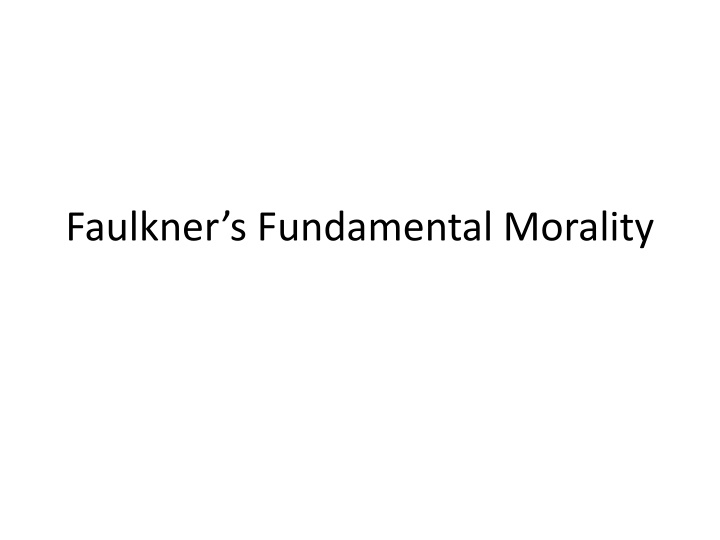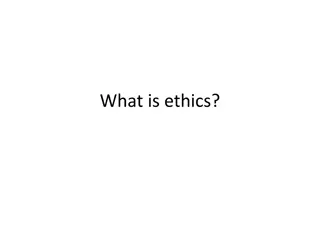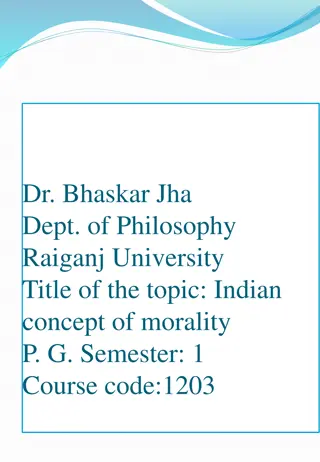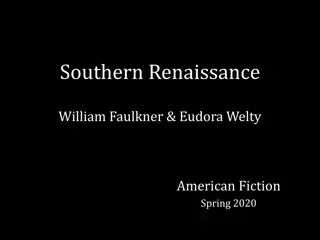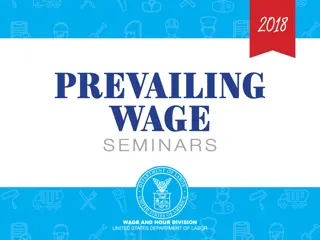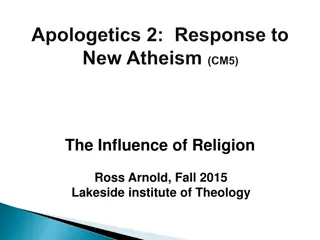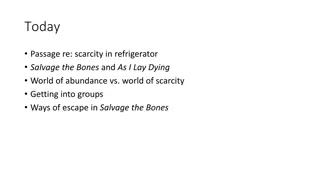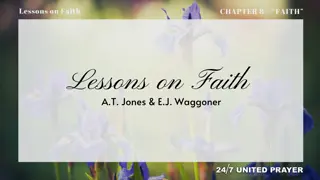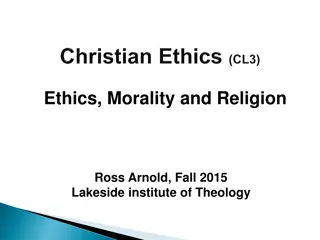Faulkner's Fundamental Morality: A Deep Dive into the Construction of Morality in Faulkner's Works
In an exploration of Faulkner's narrative innovations, this analysis delves into the intricate layers of his works, focusing on the foundational aspects of beauty and love in the construction of morality. Through multiple narrators and stream of consciousness writing, Faulkner presents a challenging yet compelling narrative that delves into the complexities of human nature and failure. The examination of textual evidence highlights the significance of recognizing beauty and the implications of its absence in shaping the characters' inner realities.
Download Presentation

Please find below an Image/Link to download the presentation.
The content on the website is provided AS IS for your information and personal use only. It may not be sold, licensed, or shared on other websites without obtaining consent from the author.If you encounter any issues during the download, it is possible that the publisher has removed the file from their server.
You are allowed to download the files provided on this website for personal or commercial use, subject to the condition that they are used lawfully. All files are the property of their respective owners.
The content on the website is provided AS IS for your information and personal use only. It may not be sold, licensed, or shared on other websites without obtaining consent from the author.
E N D
Presentation Transcript
Two-Fold Approach: 1. The Writerly the WHATS 2. The Linguistical the HOWS
Modernism Fitzgerald: soap sud whats, very pretty hows Hemingway: paralysis by parataxis
Faulkner What? WHAT?! --How? HOW?!
Introduction Faulkner s innovations regarding perspective, multiple narrators and stream of consciousness writing constitute the defining features of these works. Both shocking in their approach and notoriously difficult to unravel, they present their own challenges and peculiarities to the author as well. With the absence of an omniscient or representative voice, conveying the underlying moral principals that the author sees as crucial to society becomes its own challenge. None of these values can be clearly stated; instead, the author must rely on the interplay between his flawed characters to gradually illustrate what the ideal might be and this occurs as often through its absence as its presence.
The Two Main Features Analysis reveals that the ability to see beauty and give love are foundational to Faulkner s construction of morality; in both works, these two aspects can be used to gauge the true character of an individual. Faulkner uses the absence or presence of these values to define the inner reality of each character, and their actions function as his commentary on the nature of human failure.
Textual Evidence for Beauty Darl s recognition of beauty lends his voice importance. A lyrical quality permeates Darl s sections from the first page with his portrayal of the planks Cash holds: between the shadow spaces they are yellow as gold, like soft gold, bearing on their flanks in smooth undulations the marks of the adze blade (Faulkner Dying 1).
and its absence. Addie goes to the woods at the end of winter, in slanting sun beside a bubbling spring, and yet she seeks only to be quiet and hate (Faulkner Dying 98). At a place ripe with potential life and rich with natural beauty, she experiences only her own misery and bitterness. This single act constitutes a fundamental failure on her part, setting the tone for the rest of her section focusing on the emptiness of words, sin, God and love.
Through the fence, between the curling flower spaces, I could see them (Faulkner Sound 1). Benjy, despite not having the capacity to conceptualize time or engage in critical analysis of anything that occurs to him, nonetheless recognizes and finds comfort in beauty. In moments of calm or sleep, and in the fire, he finds bright, smooth shapes that bring him solace and indicate that he is at peace (Faulkner Sound 41).
By contrast, Jason (like Addie) demonstrates an utter inability to perceive beauty that corresponds to his deeply flawed morality.
This interpretation of reality provides telling insight into how Jason structures his world centered firmly around his sense of entitlement and bitter self-interest, utterly lacking in any perception of beauty, it is as damning a one as can be found.
Textual Evidence for Love Recognition of beauty must be combined with expressions of love. What is more, this love is not as straightforward as it initially seems, for it encompasses the issue of perspective fundamental to the entire underlying premises of the novels. Such acts of love require the capacity to act for the good of another rather than one s self.
Darl possesses great capacity to recognize beauty yet he also demonstrates an equal lack of capacity in finding this beauty in the people around him. Pettey observes: Darl often relies upon artistic metaphors to demarcate his animosity toward members of his family. For example, Darl sees Jewel in terms of banal, crude modes of art as though the form itself will be the essence of what Jewel is. (Pettey 29) Darl shows similar contempt for Anse, describing his face as carved by a savage caricaturist in a monstrous burlesque (Faulkner Dying 45), and for Cash, comparing him to a signboard (ibid 62).
Benjy the Litmus Test This is due to multiple factors: partly because love shown to Benjy must be love solely for love s sake as Benjy is incapable of returning favors; partly because Benjy is not necessarily easy to love as a slobbering and moaning man incapable of even feeding himself (Faulkner Sound 172); partly because in reading Benjy s section, the reader is granted ready access to unbiased interpretations of the actions that occur to him; but also because there is a strong sympathy in Faulkner s fiction for those who are powerless, and there is a fundamental respect for the ability of human beings to help each other in a communal fashion (Labrie 404) that interactions with Benjy encapsulate as no other interactions could.
Caddy is Critical From Caddy, Benjy receives love. Not because he is able to give her anything other than his adoration in return, but because she sees in him the innate beauty of humanity. Benjy gravitates to Caddy in the same way he gravitates towards beauty, equating her with all that is good and comforting in his world: Her hair was like fire, and little points of fire were in her eyes, and I went and Father lifted me into the chair too, and Caddy held me.
even for Jason Even Jason cannot remain unaffected by Caddy when he encounters her by their father s grave, he reflects, however briefly, that life without her in it gets him to feeling funny again. He stands beside her, conscious of the fact that without her, he is alone under Uncle Maury s reign a cold reality that leaves him in a world utterly lacking in care like the way he left me to come home in the rain by myself (Faulkner Sound 127).
The Template Quentin beauty, yes; love, yes, but he can t maintain it. Dewey Dell beauty, no; love, definitely not. Luster beauty, some; love, also some. He lies somewhere in the middle. Anse beauty, heck no; love, not really. Great comic relief, though. Dilsey beauty, in abundance; love, unfailingly. That she endures, like the love of first Corinthians, comes as no surprise at all.
Review of the whats: beauty and love. What about the hows?
The Power of Form The strongest argument for the importance of these two qualities is Faulkner s writing itself. Faulkner does not tell us that beauty and the ability to feel empathy for others are what human experience demands. He forces us to experience them in the very reading of his words words that catch and astound us with their unexpected beauty and plunge us deep into the reality of others.
BEAUTY: through the words themselves. LOVE: through the use of multiple perspectives.
As we read Darls hauntingly beautiful words, we are pulled into his reality. When we stand by Addie in the winter light, we find comfort in the smell of damp decay. Through Benjy s eyes, we glimpse the beauty in the smooth brightness of Caddy s face on the pillow. In Jason s desperate failings, our own angst leaps bitter to our throats. We suddenly see through eyes we actively shun, walk in shoes we would readily destroy if given the chance. He gives us no opportunity for denial, thrusting us into his world as it rapidly disintegrates around us. We follow Darl into madness, we receive salvation beside Dilsey.
